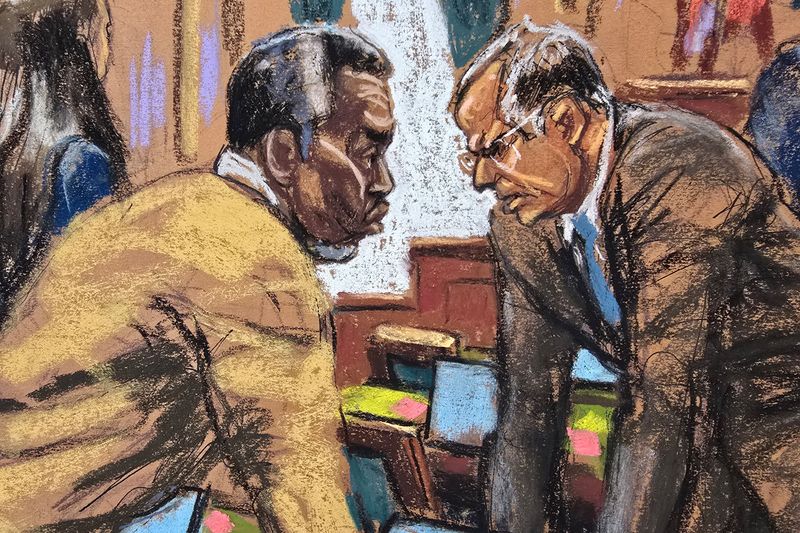Sean ‘Diddy’ Combs jury to resume deliberations after partial verdict

By Luc Cohen and Jack Queen
NEW YORK (Reuters) -The jury in Sean “Diddy” Combs’ trial will continue deliberations on Wednesday, a day after reaching a verdict on four of the five counts the music mogul faces in his sex trafficking case but failing to agree on a racketeering conspiracy charge.
U.S. District Judge Arun Subramanian said on Tuesday the jury had reached a verdict on the two counts of sex trafficking and two of transportation to engage in prostitution faced by Combs, a former billionaire known for elevating hip-hop in American culture. The judge did not reveal the verdict on those counts.
Subramanian instructed the 12-member jury to keep deliberating about the racketeering count after the panel sent him a note indicating jurors had “unpersuadable opinions on both sides.”
Combs, 55, has pleaded not guilty to all five felony counts. He faces a mandatory 15-year prison sentence if convicted of sex trafficking. A guilty verdict on either that charge or the racketeering conspiracy count could result in up to a life sentence.
Jurors must be unanimous to reach a verdict on any count.
After reading the note the jury sent Subramanian, Combs appeared emotional, rubbing his eyes and resting his face against his palm while seated at the defense table with his lawyers huddled around him.
Over the course of a seven-week trial in Manhattan federal court, prosecutors sought to persuade jurors that Combs for two decades used his business empire to force two of his romantic partners to take part in drug-fueled, days-long sexual performances sometimes known as “Freak Offs” with male sex workers in hotel rooms while Combs watched, masturbated and occasionally filmed.
Two of Combs’ former romantic partners, the rhythm and blues singer Casandra “Cassie” Ventura and a woman known in court by the pseudonym Jane, testified that he beat them and threatened to cut off financial support or leak sex tapes if they stopped taking part in the performances.
Combs’ lawyers acknowledged that the Bad Boy Records founder, once famed for hosting lavish parties for the cultural elite in luxurious locales like the Hamptons and Saint-Tropez, was at times violent in his domestic relationships. But they said the sexual activity described by prosecutors was consensual.
The apparent discord among the jurors had echoes of the sometimes fractious deliberations in movie producer Harvey Weinstein’s trial in June on sex crime charges in New York state court in Manhattan, just across the street from where Diddy is on trial.
Jurors spent five days deliberating Weinstein’s fate, with some acrimony directed toward the foreman. They eventually convicted Weinstein of one felony sex crime but deadlocked on a rape charge, leading to a mistrial on that count.
A CRIMINAL ENTERPRISE?
To convict Combs of racketeering conspiracy, prosecutors would need to prove beyond a reasonable doubt that he was part of a criminal enterprise consisting of his employees and other associates whose aim was in part to facilitate his sexual abuse and keep evidence of wrongdoing under wraps.
Jurors heard testimony from Combs’ former personal assistants who said their jobs included setting up hotel rooms for “Freak Offs” and buying their boss drugs.
An InterContinental security guard testified that Combs, in the presence of his chief of staff, paid him $100,000 to hand over what he thought was the only copy of the surveillance tape of his attack on Ventura.
And Scott Mescudi, the rapper known as Kid Cudi, told jurors Combs was likely involved in an arson on his car after Combs found out he was romantically involved with Ventura.
The defense argued Combs was a successful entrepreneur who used drugs recreationally, but kept his professional and personal lives separate.
Combs has been held in federal lockup in Brooklyn since his September 2024 arrest.
(Reporting by Luc Cohen and Jack Queen in New York; Additional reporting by Jonathan Stempel in New York; Editing by Lisa Shumaker)









